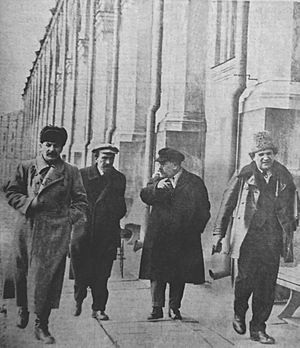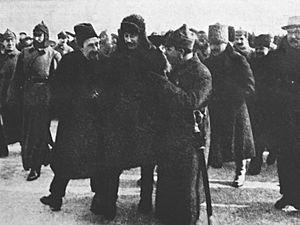Alexei Rykov facts for kids
Quick facts for kids
Alexei Rykov
Алексей Ры́ков |
|
|---|---|
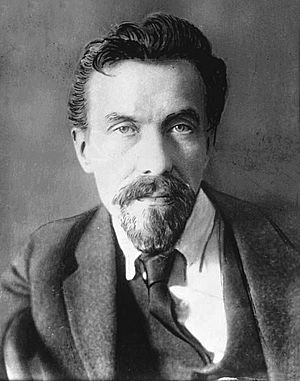
Rykov in 1924
|
|
| Chairman of the Council of People's Commissars of the Soviet Union | |
| In office 2 February 1924 – 19 December 1930 |
|
| Preceded by | Vladimir Lenin |
| Succeeded by | Vyacheslav Molotov |
| Chairman of the Council of People's Commissars of the Russian SFSR | |
| In office 2 February 1924 – 18 May 1929 |
|
| Preceded by | Vladimir Lenin |
| Succeeded by | Sergei Syrtsov |
| Chairman of the Council of Labor and Defense | |
| In office 19 January 1926 – 19 December 1930 |
|
| Preceded by | Lev Kamenev |
| Succeeded by | Vyacheslav Molotov |
| People's Commissar for Posts and Telegraphs | |
| In office 30 May 1931 – 26 September 1936 |
|
| Premier | Vyacheslav Molotov |
| Preceded by | Nikolai Antipov |
| Succeeded by | Genrikh Yagoda |
| Full member of the 11th, 12th, 13th, 14th, 15th, 16th Politburo | |
| In office 3 April 1922 – 21 December 1930 |
|
| Member of the 10th, 11th, 12th Orgburo | |
| In office 16 March 1921 – 2 June 1924 |
|
| Full member of the 9th, 10th, 11th, 12th, 13th, 14th, 15th, 16th Central Committee | |
| In office 5 April 1920 – 10 February 1934 |
|
| Candidate member of the 17th Central Committee | |
| In office 10 February 1934 – 12 October 1937 |
|
| Personal details | |
| Born |
Alexei Ivanovich Rykov
25 February 1881 Saratov, Saratov Governorate, Russian Empire |
| Died | 15 March 1938 (aged 57) Moscow, Russian SFSR, Soviet Union |
| Cause of death | Execution by firing squad |
| Nationality | Russian (1881–1938) Soviet (1922–1938) |
| Political party | RSDLP (1898–1903) RSDLP (Bolsheviks) (1903–1918) Russian Communist Party (1918–1937) |
| Children | Natalia Alekseevna Rykova (born 1917) |
| Signature | |
Alexei Ivanovich Rykov (born February 25, 1881 – died March 15, 1938) was an important Russian leader. He was a Bolshevik revolutionary and a Soviet politician. Rykov is best known for being the premier (leader) of both Russia and the Soviet Union. He held these roles from 1924 to 1929 for Russia and from 1924 to 1930 for the Soviet Union.
Rykov joined the Russian Social Democratic Labour Party in 1898. When the party split in 1903, he joined the Bolsheviks, led by Vladimir Lenin. He was active in the Russian Revolution of 1905. Before the October Revolution of 1917, he became a member of the Petrograd and Moscow Soviets. He was also elected to the Bolshevik Party's Central Committee.
Rykov was considered a moderate. He sometimes disagreed with Lenin and other radical Bolsheviks. However, he became very important when the October Revolution took over the government. He served in many roles in the new government. One of his first jobs was People's Commissar for Internal Affairs. This was in the first group of leaders called the Council of People's Commissars (Sovnarkom), led by Lenin.
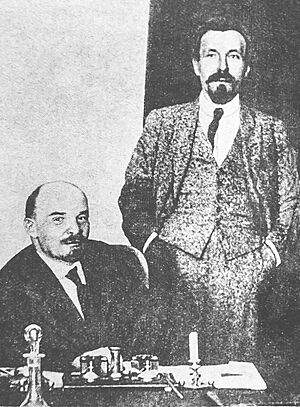
During the Russian Civil War (1918–1923), Rykov helped manage the economy. He made sure food was given to the Red Army and the Red Navy.
After Lenin became very ill in March 1923, Rykov and Lev Kamenev were chosen as Lenin's deputies. Kamenev acted as the Soviet Union's premier.
Lenin passed away in January 1924. In February, Rykov was chosen to be the premier of both the Russian Soviet Federative Socialist Republic and the Soviet Union. He held these positions until May 1929 and December 1930, respectively. In December 1930, he was removed from the Politburo, a top political group.
From 1931 to 1937, Rykov worked as the People's Commissar of Communications. This was a role in the same council he used to lead. In February 1937, he was arrested with Nikolai Bukharin. In March 1938, they were found guilty of serious charges and executed.
Contents
Biography
Early Life and Education (1881–1900)
Alexei Ivanovich Rykov was born on February 25, 1881, in Saratov, Russia. His parents were farmers from the village of Kukarka. Alexei's father passed away in 1889 from cholera. His older sister, Klavdiya, then took care of him. She worked for a railroad company.
In 1892, Alexei started middle school in Saratov. He was a very good student. He began high school at age 13. He was excellent in subjects like math, physics, and science. At 15, Rykov decided to stop attending church. He graduated from high school in 1900. He then enrolled at the University of Kazan to study law, but he did not finish his degree.
Early Political Activity (1898–1917)
Rykov joined the Russian Social Democratic Labour Party (RSDLP) in 1898. In 1903, the party split into two groups: the Bolsheviks and the Mensheviks. Rykov supported the Bolsheviks. He worked for the Bolsheviks in cities like Moscow and Saint Petersburg. He also played an important part in the Russian Revolution of 1905.
He was elected to the Party's Central Committee at several early congresses. These were important meetings where party decisions were made. He was exiled to France for a time in 1910-11. Later, he was exiled to Siberia because of his revolutionary work.
Revolution and Civil War (1917–1920)
Rykov returned from Siberia after the February Revolution of 1917. He rejoined the Bolsheviks, even though he was sometimes unsure about their more extreme ideas. He became a member of the Petrograd and Moscow Soviets. He was also elected to the Central Committee of the Bolshevik Party in 1917. During the October Revolution of 1917, he was part of the Military Revolutionary Committee in Moscow.
After the revolution, Rykov was made the People's Commissar of Internal Affairs. This meant he was in charge of internal security. At one point, a railroad union threatened a strike. This was unless the Bolsheviks shared power with other socialist parties. Rykov and others thought they should negotiate. However, Lenin and Leon Trotsky convinced the Central Committee to stop talks. Because of this, Rykov and some others resigned from the government.
On April 3, 1918, Rykov was put in charge of the Supreme Council of National Economy. He held this role throughout the Russian Civil War. He also helped manage food supplies for the Red Army and Navy. In April 1920, he was elected to the Communist Party Central Committee.
Rise to Leadership (1920–1927)
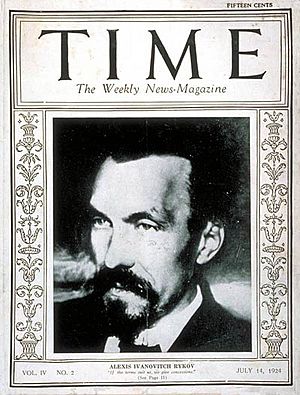
After the Bolsheviks won the civil war, Rykov took on new roles. In May 1921, he became Deputy Chairman of the Council of Labor and Defense. As Lenin's health declined, Rykov became his deputy in the Sovnarkom. Rykov joined the powerful Politburo in April 1922.
After Lenin's death in January 1924, Rykov became the Chairman of the Council of People's Commissars of the USSR. He also became premier of the Russian SFSR. He took on these important leadership roles in February 1924.
Rykov, along with Nikolai Bukharin and Mikhail Tomsky, led the moderate group within the Communist Party. They supported the NEP, which allowed some private business. This group supported Joseph Stalin against Leon Trotsky in the mid-1920s. Later, they also supported Stalin against other opponents like Grigory Zinoviev and Lev Kamenev. In January 1926, Rykov also became Chairman of the Soviet Council of Labor and Defense.
During his time as premier, a tax was placed on vodka. It became known as "Rykovka."
Stalin's Rise and Rykov's Decline (1927–1938)
During Rykov's time as premier, Joseph Stalin gained more and more power. Stalin, as General Secretary, controlled who joined the Communist Party. The Party's power grew, taking over from the official government bodies. By December 1927, Stalin had defeated his main opponents.
After this, Stalin started to use more extreme policies. This led to disagreements with Rykov and the moderate group. In 1929, the moderates, called the "Right Opposition," were defeated. They were forced to admit they had made "mistakes." Rykov lost his position as Premier of the Russian SFSR in May 1929.
On December 19, 1930, after admitting more "mistakes," Rykov was replaced by Vyacheslav Molotov as Soviet Premier. Two days later, Rykov was removed from the Politburo. This ended his chances of further political advancement.
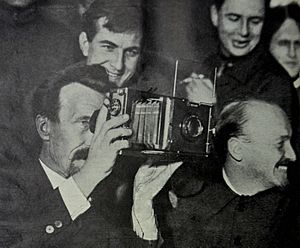
On May 30, 1931, Rykov was appointed People's Commissar of Posts and Telegraphs. He held this job until September 26, 1936. In February 1934, he was demoted to a non-voting member of the Party's Central Committee. After accusations were made against other leaders, Rykov lost his job as People's Commissar of Communications.
Trial and Death
As Joseph Stalin's government became more strict, Rykov and Bukharin were removed from the Communist Party. They were arrested in February 1937. In March 1938, at a major trial, Rykov, Bukharin, and others were found guilty of serious charges. They were sentenced to death. Rykov asked for mercy, but his request was denied. On March 15, 1938, most of them were executed.
Family
Rykov's wife, Nina Semyonova, was arrested in 1937. She was executed in March 1938.
Their daughter, Natalya, born in 1916, worked as a teacher. After her father's arrest, she was sent away. She was arrested in March 1938 and sentenced to eight years in a labor camp. After finishing her sentence, she was exiled again. She was released in September 1954, after 16 years in prison and exile.
Rehabilitation
In 1988, the Soviet government officially cleared Rykov's name. This happened during a period of change called perestroika. Rykov was then put back into the Communist Party of the Soviet Union's records.
See also
 In Spanish: Alekséi Rýkov para niños
In Spanish: Alekséi Rýkov para niños
- Bibliography of the Russian Revolution and Civil War
- Bibliography of Stalinism and the Soviet Union
Images for kids
 | Kyle Baker |
 | Joseph Yoakum |
 | Laura Wheeler Waring |
 | Henry Ossawa Tanner |


